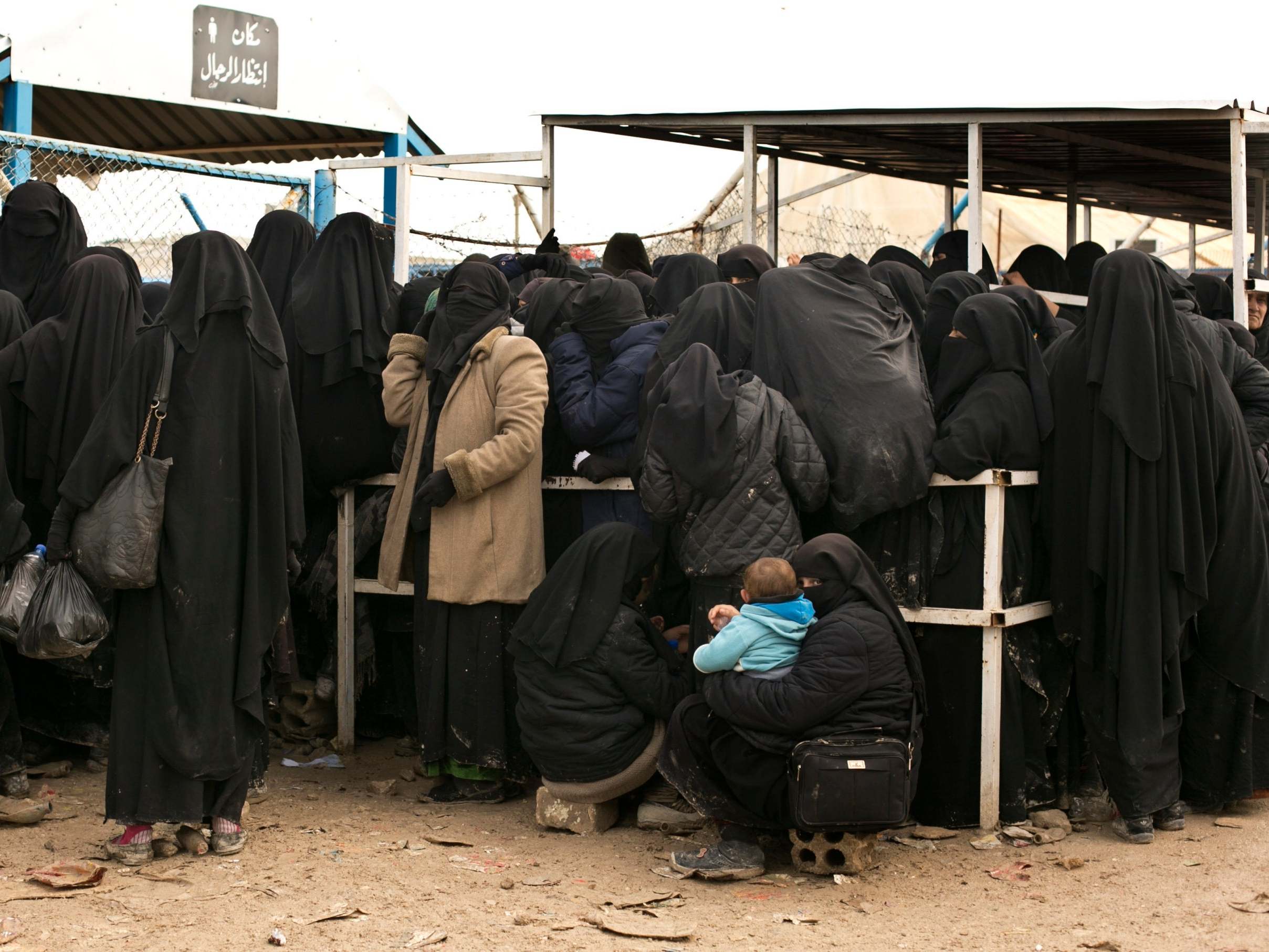‘Hardcore’ Isis ideologues held in Syrian camps represent long-term risk, warns US-led coalition
Many families of Isis members held in Syrian camps are still loyal to group

The US-led coalition formed to defeat Isis has warned that a new generation of jihadis is being created in camps holding the families of Isis fighters.
In an exclusive interview with The Independent, Major General Alexus Grynkewich, deputy commander of the international coalition, described the potential for radicalisation in the camps as “the biggest long-term strategic risk” in the fight against the jihadi group outside of ongoing military operations.
“The anecdotal stories we have about some of the women with their children who were surrendering, if you will, is that there are hardcore Isis ideologues among them. We certainly have seen reporting from some of the partners who work in those camps that there is a fair amount of that ideology,” he said.
“The children are being brought up in that. So you can almost see the next generation of Isis in those camps today. It’s a tremendous problem.”
Tens of thousands of women and children fled the last slither of the self-proclaimed caliphate, in the eastern Syrian village of Baghouz, before its complete recapture earlier this year.
Syria at war: Fleeing the caliphate
Show all 14Many of them were local residents who became trapped within Isis areas by the battle, but the majority were the wives and family members of fighters, who showed little sign of abandoning the group.
Most are now being held in detention camps controlled by the Syrian Democratic Forces (SDF). The largest of those camps, al-Hol, has a population of more than 70,000 people – mostly women and children from Syria and Iraq, together with around 9,000 foreign citizens.
Nearly half of its inhabitants are children under the age of 12. They will have been subjected to years of indoctrination under Isis, which may be continuing to this day.
Journalists and humanitarian workers who have visited the camp have reported women shouting Isis slogans, and there have been a number of attacks by alleged Isis sympathisers against other residents for not adhering to the group’s strict religious rules. On Wednesday, a female foreign Isis detainee reportedly stabbed a Kurdish guard in the back, sparking an evacuation of NGO workers.
“Outside the military dimension, the biggest long-term strategic risk that I see is a continuation of that ideology and its ability to fester in some of those environments,” said Major General Grynkewich.
The international community has struggled to find an answer to the question of what to do with the thousands of residents of Hol, and a number of smaller camps in the country.
Foreign governments have shown little willingness to take back their citizens from the camps over fears they will pose a significant security risk. There are thought to be at least 19 British women currently at Hol, and camps Roj and Ain Issa, together with at least 30 of their children.
The plight of British children stuck in Syria made the headlines earlier this year when the infant child of Shamima Begum, named Jarrah, died in the Hol camp. The British teenager fled her home in Bethnal Green, London, to join Isis in Syria in 2015.
Sajid Javid, the home secretary, has previously said that he would move to block any British citizen suspected of joining Isis from returning. However, Jeremy Hunt, foreign secretary, recently suggested their children might be welcomed back.
Experts in radicalisation say Isis has put considerable effort into cultivating the next generation in order to survive.
“By creating a narrative that converts defeat into a ‘test of faith’, Isis has left the door open for a future re-emergence or reincarnation of the physical caliphate, as well as the continuation of its underlying values and world view,” Gina Vale, research fellow at The International Centre for the Study of Radicalisation based at King’s College London, told The Independent.
“One way in which Isis put this into practice is the systematic indoctrination, and in some cases military training, of minors within its territory. Isis sought to empower and position minors to be the future guardians and warriors of its cause, entrusting women with their upbringing and development,” she said.
But while there is a risk of radicalisation among these groups, the picture is complex.
“For most children exposed to Isis’s radical ideology and rule, this has manifested primarily in traumatisation and victimisation that requires nuanced rehabilitation and support, though it is also important to acknowledge the potential for some individuals to pose a security risk.”
Vale added that the status quo, of holding thousands of women and children in camps for an extended period, is “fuelling the sense of injustice and hardship” among the group’s supporters.
Coalition officials have stressed that the military fight against Isis is not yet done. In the months since the loss of its caliphate, the group has been rebuilding in remote areas of Iraq, while sleeper cells are being discovered by Kurdish forces every week in Syria.
Despite signs of a comeback, the group’s power has been vastly diminished, and attention is slowly turning to preventing its resurgence. Part of that battle is combating the ideology behind it, according to Major General Grynkewich.
“I think a population that has been exposed to Isis brutality in the past is much less willing to believe the storyline as that ideology comes in,” he said. “Having said that, that’s a little bit different than what is going on in IDP camps, in Hol, where they have brought into that Isis ideology.”
He added that the issue would not be solved without “an intervention through some sort of deradicalisation programme”.
Subscribe to Independent Premium to bookmark this article
Want to bookmark your favourite articles and stories to read or reference later? Start your Independent Premium subscription today.

Join our commenting forum
Join thought-provoking conversations, follow other Independent readers and see their replies